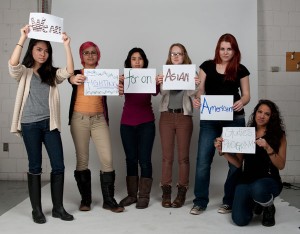After years of pushing for more Asian-American influence in Ithaca
College’s curriculum, students have won the approval for an Asian-American Studies minor from Marisa Kelly, provost and vice president of academic affairs.

Though the Asian-American Studies minor was approved Monday by Kelly, it still has many more steps it must go through before it can be formally approved by the college.
The minor, if approved, would be housed in the Center for the Study of Culture, Race and Ethnicity. The center has had minors in African Diaspora Studies and Latino/a Studies since 2006. At the time, there were not enough faculty and relevant classes to support an Asian-American Studies minor.
Students have largely been behind the push for an Asian-American Studies minor, particularly juniors Kristiana Reyes and Kristy Zhen, and Kaitlin Hibbs ’11.
Last spring, they made a documentary called “Missing in History,” which focused on the need for an Asian-American Studies program. They also began a petition that currently has more than 400 signatures. The push for the minor is also backed by the student-run Committee for Inclusive Education, an on-campus group that promotes cross-cultural education.
Asma Barlas, professor and program director of CSCRE, said the provost’s approval is just the first step to move forward with the minor.
“What the provost has done so far is to simply approve going ahead with developing this minor,” Barlas said. “So the real work is going to begin now.”
Barlas said the department doesn’t offer enough courses on the subject, which is why the center is also
requesting a full-time faculty hire. The minor must also go through the Academic Policies Committee before it can be formally approved.
Because of the college’s desire for more ALANA-focused curriculum, Barlas said, there is no reason that a component should be missing.
“If we are going to deliver an ALANA curriculum, which Ithaca College says it’s going to do, how can we justify not having Asians as part of ALANA?” Barlas said. “One in four people in the world are Asian, and Asians are a large segment of minorities on our campus, and so I think those are solid reasons.”

The Committee for Inclusive Education has made its goal to get students interested in an Asian-American Studies minor, especially students who feel they don’t relate to the issue, Reyes said.
“We need to target the students, especially because they’re the majority of the school, because their support can really leverage our cause,” she said. “Even though they’re not the ones creating the curriculum, they’re the ones that enable it.”
Senior Madeline Jarvis said cultural and racial education is something that’s missing in all educational levels.
“We supposedly live in this advanced culture that we don’t have these problems anymore, but these issues of race, gender and identity do have painful histories attached to them, and they’re an undercurrent in most of our social interactions whether people would like to address them or not,” Jarvis said.
Junior Meira Keil said it is not only important to learn about racial and cultural issues but to be able to give a voice to them. She said adding more classes to the curriculum would help achieve that.
“If we can articulate what we’re seeing, it’s being more aware of what you see everyday, she said. “So we stress the importance of the Asian-American Studies program and the ethnic studies in general because it provides a perspective to see the entire world in a different way.”
The last theme of the IC 20/20 vision, Ithaca College’s strategic 10-year plan, highlights initiatives that address diversity on campus and in the curriculum. In initiative 15, “Educating the Global Citizen,” the college cites plans to create an Ithaca Center in China.
Barlas said if the college plans to send students to China, they should have the opportunity in the curriculum to be more educated on the culture and history before going.
“If you want to send Ithaca College students to China, you don’t want to just send them there as tourists, you want to send them there with some sort of academic background,” she said. “So there should be some courses here on our own campus that can prepare them — both to learn about China, and about the role of Chinese immigration into the U.S. that have made so much development possible throughout U.S. history.”
Though the minor must jump through further hoops in the approval process before it can be a part of the curriculum, Barlas said the provost’s backing signifies an institutional commitment.
“At least getting approved for this minor means that we now have a solid basis for asking for a [faculty] line because if the college says it’s committed to a program, then it has to put some resources behind it,” she said. “At least we’re hoping.”
Kelly could not be reached this week for comment.







